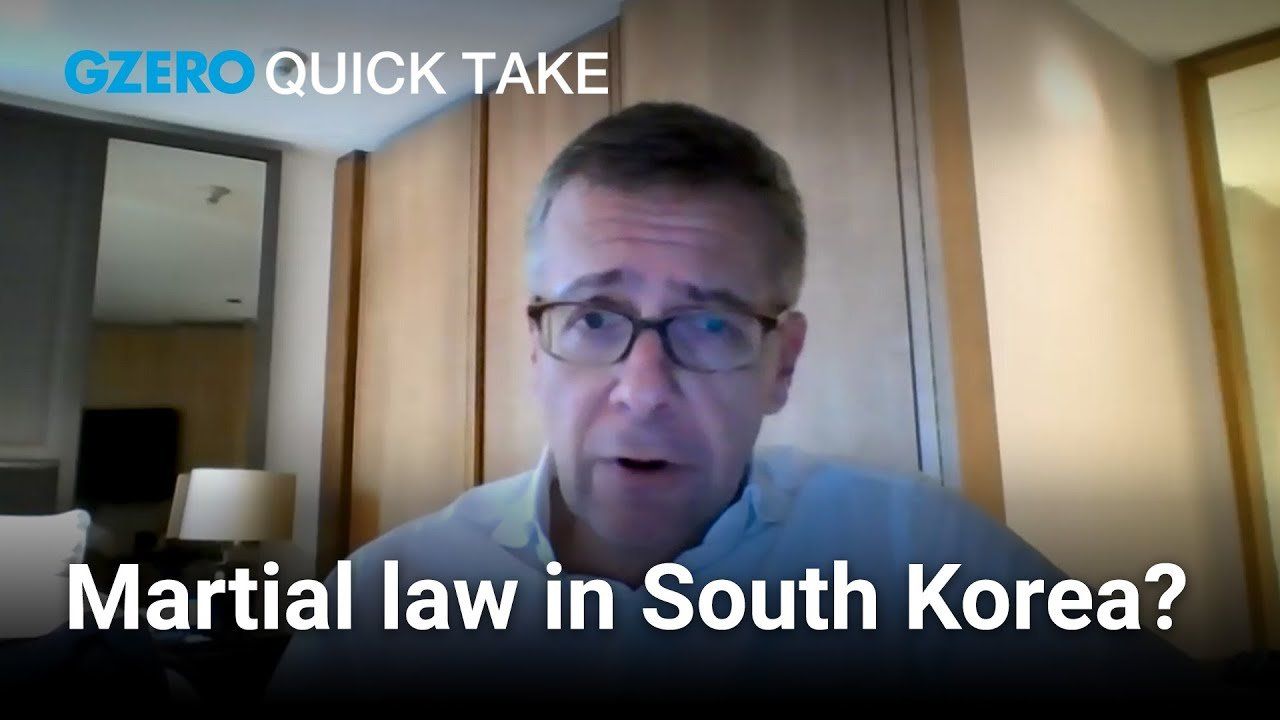December 03, 2024
Ian Bremmer's Quick Take: Hi, everybody. Ian Bremmer here from Mexico City, but talking about South Korea, which is not what anyone was expecting today. President Yoon Suk Yeol of South Korea deciding to suddenly declare emergency martial law, announcing together with the military all political activities prohibited. All media now under state control. No strikes, demonstrations allowed. Basically, the President of South Korea declaring that his country is North Korea, at least for a few hours. But of course, South Korea is not North Korea. It is a vibrant democracy with strong institutions, and the parliament is in strong opposition of what he is doing, as are the people.
President Yoon had said that the reason for this is that the opposition is supporting North Korea and that there are North Korean forces that have been infiltrating the South Korean opposition. It is true that this opposition, this is by the way the ruling party in parliament, supports the "Sunshine Policy" and Yoon's government is hard line on North Kore. But there's no evidence of any North Korean infiltration or involvement. What there is evidence of is that President Yoon is incredibly unpopular. Lots of corruption scandals around his family, around his government, approval ratings in the 20s, which is pretty much the lowest you'll see of any advanced industrial democracy today. Though there are a number of countries that are trying to give him a hard run for it.
The opposition party, the ruling party in parliament, has been pushing really hard to make his life miserable. They have investigated his wife. They've tried to impeach a number of cabinet officials. They're refusing to pass the budget and apparently he just couldn't take it anymore. I'll tell you, nobody expected it. Aside from the military leaders that he coordinated with, senior government officials were shocked by the move. Our parliamentarians were shocked by the move. This isn't like January 8th in Brazil where it was clear that Bolsonaro was going to do everything he could try to overturn the elections. Just as it was clear January 6th in the United States that Trump was going to do everything he could to overturn election.
This is a very different situation. This was a very sudden move. It is perfectly legal to declare martial law, but you have to actually pre-notify the National Assembly, which he did not do, so it wasn't done legally. You also need 151 lawmakers to approve martial law within 72 hours. That isn't going to happen. The next thing that's very likely to occur are lots of demonstrations and it's very hard to imagine that the military would violently break them up. This isn't Pakistan. And we also saw an emergency session that they got a majority for of National Assembly lawmakers that all 190 voted to end this. So I think what's going to happen is President Yoon is going to wake up tomorrow with a really bad hangover, certainly a political one, maybe others too, and going to realize that he did something incredibly stupid, overreached, and has destroyed any remaining legacy that he might have had.
South Korea's going to remain a democracy. This coup will be very short-lived. I'd be surprised if outside of South Korea we're talking much about it in coming weeks. But it is important. It's important because South Korea is an ally of the United States. It now has a robust relationship with Japan. In fact, the tripartite agreement brokered by Biden at Camp David was arguably his greatest foreign policy success. The equivalent of the Abraham Accords by the Trump administration. And the right-wing Yoon is particularly aligned with Japan and the Japan's LDP Party as well as with the Americans and certainly would be with incoming President-elect Trump. So in that regard, the US is going to have a hard time being overtly critical. They won't want to because, as unhinged as he is, he is a strong ally.
And an incoming administration, if he's now assumingly going to be impeached and probably end up in prison, is not going to be as aligned with the United States or Japan going forward would also lead to a softer policy towards North Korea. So I do think it matters geopolitically long-term, but the coup itself is not something that is going to be sticking around. So I think we still have a democracy in South Korea. We'll watch this unfold and I'll talk to you all real soon.
From Your Site Articles
- Biden brings South Korea and Japan together ›
- Japan, US, South Korea unite against North Korea-Russia Pact ›
- How will South Korea respond to North Korean troops in Russia? ›
- Yoon leads South Korea away from China, toward the US ›
- What's next for South Korea after President Yoon's impeachment? - GZERO Media ›
More For You
Nearly four years into Russia's invasion of Ukraine, the push to end the war is intensifying. The past few weeks produced not one but two proposals.
Most Popular
Sponsored posts
The AI economy takes shape
What's Good Wednesdays
What’s Good Wednesdays™, December 3, 2025
Walmart sponsored posts
Walmart's $350 billion commitment to American jobs
- YouTube
Ian Bremmer breaks down why the latest Russia-Ukraine “peace push” is headed back to Moscow and why the outlook is bleak.
Luis Fernando Cerimedo, advisor of Presidential candidate Nasry Asfura of the National Party of Honduras (PN), speaks during a press conference after the general election, in Tegucigalpa, Honduras, December 1, 2025.
REUTERS/Jose Cabezas
There are close presidential races, and then there’s the one in Honduras, where just 515 votes separate the top two candidates following Sunday’s election in the Central American nation.
© 2025 GZERO Media. All Rights Reserved | A Eurasia Group media company.
